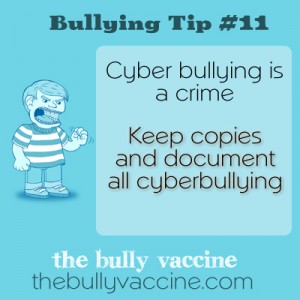I teach people how to use operant conditioning to train bullies to stop. And yes, it really does work. It’s pretty much the only thing that does. I provide free online programs and videos that parents can use to work with their child to help educate themselves and their child on what exactly has to happen to get the harassment to stop. It isn’t easy – but it can be done if you use science to your advantage.
Here are some Q&A regarding cyberbullying and how to get it to stop.
What is cyber bullying?
Cyberbullying is a form of verbal bullying that is done, not in person, but online. The unfortunate aspect about it is that you can’t get away from it without disconnecting from the internet which disconnects you from your social support network. The good thing about it is because it is “published” it creates a digital trail of evidence if it turns out that the cyberbullying is actually criminal in nature.
What makes it criminal?
Is there a threat? Is the teen being stalked using digital devices? If either of these is occurring, document the abuse and bring it to the police – especially if it includes threats. And continue to document the abuse through the retaliation process.
How can parents can help teen victims of cyber bullying?
Different kids respond different ways to abuse from others. Parents do need to monitor their children and make sure they get professional psychological help if they need it.
It is important to not only document incidences of cyberbullying (taking screen shots and storing emails), but it is also important to develop a strategy to make it stop.
When it comes to stopping bullying, that is a process that takes place over time. It involves an extinction burst (which most people experience as retaliation). Unless a child is prepared for the entire extinction process, they will try to get the bullying to stop and fail. The reason for this failure isn’t that they weren’t able to do what you asked them to do, but that you didn’t prepare them for what happens next and why it is critical that they don’t stop the extinction process half way through. And yes, they will tell you it isn’t working it is just making things worse. That’s actually part of the process, unfortunately it’s rarely taught.
Parents need to understand that cyberbullying isn’t happening in isolation. It is part of a larger pattern of harassment behavior, that in the adult world would be considered stalking – and it is as emotionally damaging as stalking – so take it seriously. The best thing you can do is engage your child over time to develop a strategy with them and to make reporting a central part of that strategy – over a period of time. As your child starts to see successes with this, they will open up more and let you know more about what it is they have been experiencing. Let’s put it this way – if you know your child is being bullied, you don’t actually know how bad it. Your child isn’t telling you everything. That will take trust and a couple of months of steady work with them to get them to open up.
What strategies work?
Whatever strategy you develop, has to be comprehensive and your child has to take the lead on it with your support and assistance. Whatever they are willing to do or not do is where you start. They probably won’t be willing to disconnect entirely, but perhaps you can convince them to ban certain individuals from their Facebook streams so that they don’t see the content anymore.
You need your child to report and your child needs you to not freak out when they report. Lots of kids don’t tell their parents about the harassment they receive because parent’s first response is to get rid of their child’s access to the internet. Be more creative. Help them keep their access to the internet but eliminate the people harassing them. That works to instill trust and helps your child to come to you for help in the future.

